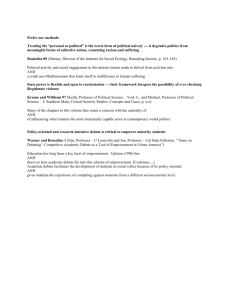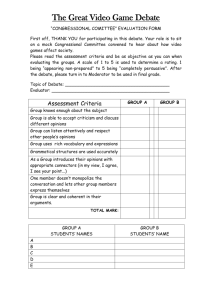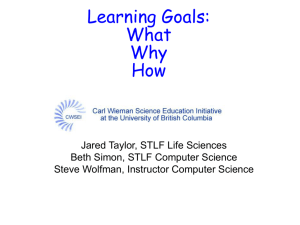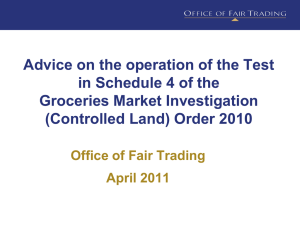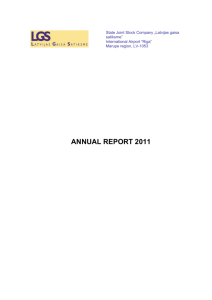This is not a typical introduction to American politics course
advertisement
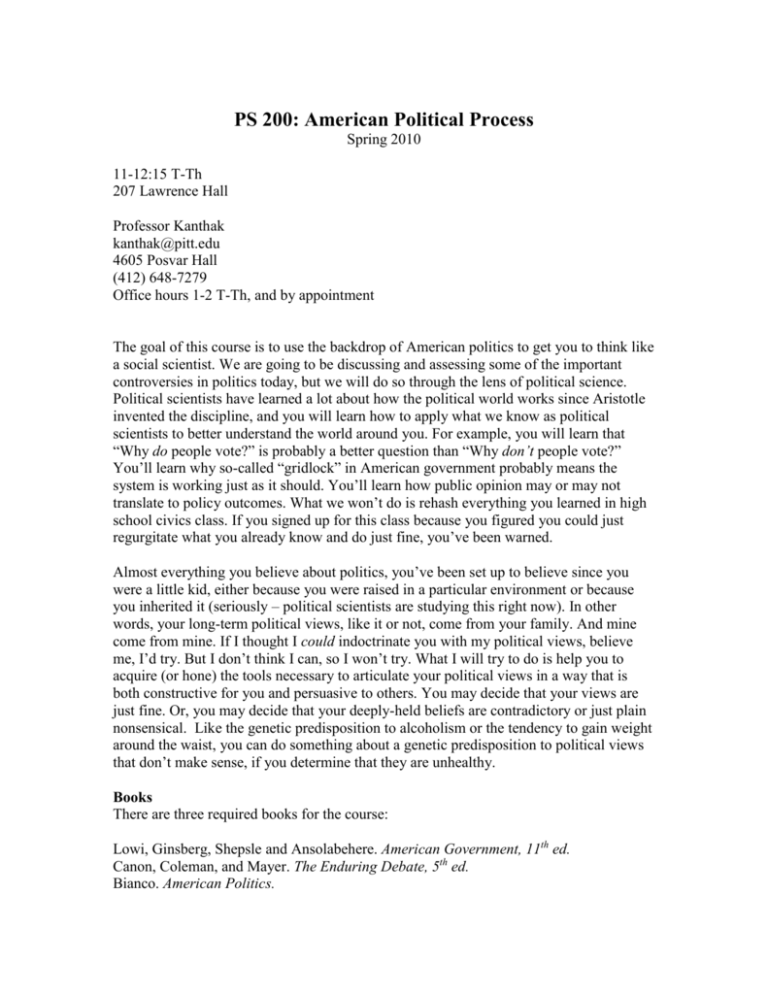
PS 200: American Political Process Spring 2010 11-12:15 T-Th 207 Lawrence Hall Professor Kanthak kanthak@pitt.edu 4605 Posvar Hall (412) 648-7279 Office hours 1-2 T-Th, and by appointment The goal of this course is to use the backdrop of American politics to get you to think like a social scientist. We are going to be discussing and assessing some of the important controversies in politics today, but we will do so through the lens of political science. Political scientists have learned a lot about how the political world works since Aristotle invented the discipline, and you will learn how to apply what we know as political scientists to better understand the world around you. For example, you will learn that “Why do people vote?” is probably a better question than “Why don’t people vote?” You’ll learn why so-called “gridlock” in American government probably means the system is working just as it should. You’ll learn how public opinion may or may not translate to policy outcomes. What we won’t do is rehash everything you learned in high school civics class. If you signed up for this class because you figured you could just regurgitate what you already know and do just fine, you’ve been warned. Almost everything you believe about politics, you’ve been set up to believe since you were a little kid, either because you were raised in a particular environment or because you inherited it (seriously – political scientists are studying this right now). In other words, your long-term political views, like it or not, come from your family. And mine come from mine. If I thought I could indoctrinate you with my political views, believe me, I’d try. But I don’t think I can, so I won’t try. What I will try to do is help you to acquire (or hone) the tools necessary to articulate your political views in a way that is both constructive for you and persuasive to others. You may decide that your views are just fine. Or, you may decide that your deeply-held beliefs are contradictory or just plain nonsensical. Like the genetic predisposition to alcoholism or the tendency to gain weight around the waist, you can do something about a genetic predisposition to political views that don’t make sense, if you determine that they are unhealthy. Books There are three required books for the course: Lowi, Ginsberg, Shepsle and Ansolabehere. American Government, 11th ed. Canon, Coleman, and Mayer. The Enduring Debate, 5th ed. Bianco. American Politics. Course requirements There are five components to your grade, outlined below: Midterm one Midterm two “The Debate” Short answers Final Feb 9, in class Mar 23, in class Due dates vary Due dates vary Apr 28, 8-9:501 20 percent 20 percent 30 percent 5 percent 25 percent Exams There are three examinations in this course, and all will be “multiple-choice plus” format. Questions are in traditional multiple choice format, but a complete answer will include both the correct choice and a 3-4 sentence justification for that choice. Your grade for each answer is based equally on the choice and the justification. The good news: if you get a question wrong, but your justification shows some understanding of the subject matter, you get partial credit. The bad news: if you get a question right, but your justification is either wrong or absent, you get partial credit. The midterms will have ten questions each, and the final will have twenty questions. Will this be on the test?: You’ll never have to ask this question in this class. I don’t believe in guessing games, so I tell you exactly what will be on the test at the beginning of each class session. I start out with a slide titled “Objectives.” These are the things you ought to be able to do by the end of the class. If you can do all those things, you’re set. That’s what’s on the test. “The Debate” Most classes like this one have you write a boring paper about a boring topic. These papers are, somewhat definitionally, boring to write. But that is your problem, not mine. My problem is that they are boring to read. And in the Age of Reality Television Programming, I figure there has to be a better way. By better, of course, I mean “better for me.” Probably, it is better for you, too, but this is what is called a “positive externality,” a concept you will learn in class if you do not already know it. So I figured I could steal something from Mark Burnett’s2 playbook. Sadly, the university has rules about my putting you on a desert island with nothing but your wits and a book of wet matches to protect you, so I had to get creative. What I’ve done is to create an assignment whose end is to attempt, as a group, to solve some of the major political issues of the time. My mind is both an odd place and a rather labyrinthine one. For this reason, you’ll have to see the fairly detailed memos on this topic to see how this assignment works. It is too complicated to get into here. 1 2 Time subject to change, but not by me. He’s the “Survivor” guy. Short responses Short responses are quick in-class assignments that you will hand in. Usually, they are just a means for you to gather your thoughts before we proceed to discussion on a particular topic. They will not be graded, per se, but you’re expected to engage the material and say something that at least attempts to be insightful. And they will be worth five percent of your grade. Why five percent?, you might ask. I give you five percent because if you are coming to class and actually engaging the material, I think you ought to get some kind of credit for that. On the other hand, attendance is explicitly not mandatory in this class. If you don’t want to come, don’t come. We’re all grown-ups here. And if you’re a dullard who doesn’t want to actively engage the material, frankly, I’d prefer you not show up to class just to sleep or read the newspaper. I like to assume that if you’ve shown up, you’ve done it because you’re intellectually curious and you want to broaden your intellectual horizons, not because you just want to do the academic equivalent of punching a time clock. If I offer more than five percent credit for short responses, that just encourages the dullards to show up. Please note that short responses can be completed in class only. If you miss that class, you cannot make up the assignment. This is the case regardless of how vividly you can describe the symptoms of whatever dread disease kept you from attending class. I understand that sometimes people get sick or otherwise have valid excuses for not coming to class. In the long run, if you attend class regularly and work hard, you will be fine. Course policies Students with disabilities: If you have a disability for which you are or may be requesting an accommodation, you are encouraged to contact both me and Disability Resources and Services, 216 William Pitt Union, (412)648-7890/(412)383-7355(TTY), as early as possible in the term. DRS will verify your disability and determine reasonable accommodations for this course. Grading: Again, I don’t believe in guessing games. I make up fairly detailed grading rubrics for each assignment, and I grade accordingly. You can access these rubrics on CourseWeb. Attendance: Students are responsible for attending class every day and understanding the material for that day. Yes, it will be on the test. That said, I will not regularly take attendance. Please do not attend class if you are not willing to pay attention, or at least to pretend to pay attention. (I can, in fact, see that newspaper you are reading.) If you prefer not to engage the material, please feel free to skip the class as much as you like. Doing so will make your work very poor, and therefore much easier for me to assess. Cheating: Don’t even try it. Seriously. If I catch you (and I will do everything in my power to catch cheaters), I will follow university procedures for reporting your offense. You will also receive a failing grade for the course. Read that last part again: You will fail the course, not just the assignment for which you went over to the Dark Side. You can familiarize yourself with the University of Pittsburgh’s Code of Academic Integrity here: http://www.pitt.edu/~provost/ai1.html. Know it. Late work: I do not accept late work, nor do I reschedule exams, unless you have a documented excuse. If you know you will have trouble getting to the exams or coming to your assigned debate date, you would be wise to drop the class now. Incompletes: It is my policy not to give incompletes. I do so only in rare circumstances, such as a documented illness. (Note: Getting tired of school at the end of the term is not rare, and therefore is not a valid excuse for an incomplete.) Asking for an incomplete except in the direst of circumstances beyond your control only eats away at the precious moments we both have on earth. Cheating: There. I said it again. Seriously, don’t do it. I’ve reported people before and I’ll do it again. I firmly believe that the vast majority of students are honest, hardworking folks who wouldn’t even think of cheating. And I’ll get a real job where I actually have to produce something useful before I undermine the efforts of the honest majority by letting cheaters get away with it. Anyway, you will feel really bad if you have to live with yourself after such deceitful behavior. I don’t want that for you. And neither do you. Topics and assigned readings Jan 7: Introduction Going over the syllabus, getting-to-know-you games, a nice round of “Telephone,” that kind of thing. Jan 12: What is politics? Read LGS Ch. 1, B Chs. 1 and 3 Jan 14: The Five Principles of Politics Read LGS Ch. 1 PICK DEBATE GROUPS IN CLASS Jan 19: The Importance of Institutions Read B Ch. 2 Jan 21, 26: The Constitution, or at least the parts we haven’t changed yet Read LGS Ch.2 MEDIA REPORT LETTERS DUE IN CLASS JAN 21 “RESOLVED STATEMENT” DUE TO YOUR GROUP’S COURSEWEB DICUSSION JAN 21 GROUP MEETINGS TO DETERMINE ROLES AND GROUP RESOLVED STATEMENT AT THE END OF CLASS JAN 26 o MC WILL SUBMIT THE GROUP RESOLVED STATEMENT TO THE GENERAL COURSEWEB DISCUSSION Jan 28: Federalism: States vs. the nation: It’s a brawl! Read LGS Ch. 3 Feb 2, 4: Civil liberties/civil rights: Bad things the government/other people do to us Read LGS Ch. 4 Feb 9: MIDTERM ONE Feb 11,16: Congress: The finest of the three branches Read LGS Ch. 5, B Ch.6 Feb 18: Debates 1 TODAY’S GROUPS’ DEBATE ASSESSMENTS DUE IN CLASS Feb 23, 25: The Presidency: A branch of one Read LGS Ch. 6, B Ch. 7 DEBATE REVIEWS (FOR EVERYONE) DUE IN CLASS FEB 23 Mar 2, 4: The Judiciary: An OK branch, too, I guess Read LGS Ch. 8, B Ch. 8 Mar 16: Debates 2 TODAY’S GROUPS’ DEBATE ASSESSMENTS DUE IN CLASS Mar 18: The Bureaucracy: Just a bunch of bureaucrats Read LGS Ch. 7 DEBATE REVIEWS (FOR EVERYONE) DUE IN CLASS Mar 23: MIDTERM TWO: The Curse of the Black Pearl Mar 25: Voting. Or not. Read B Ch. 4 Mar 30: The Spatial Model of Voting: Not just a straight line anymore Read B Ch. 5 Apr 1: Debates 3 TODAY’S GROUPS’ DEBATE ASSESSMENTS DUE IN CLASS Apr 6, 8: Public Opinion: What we know, what we think, and what we think we know Read LGS Ch. 9 DEBATE REVIEWS (FOR EVERYONE) DUE APR 6 IN CLASS Apr 13: Elections: Voting, American Style Read LGS Ch. 10 Apr 15: Political parties: Factions with ballot access Read LGS Ch. 11 Apr 20: Debates 4/ Ask me anything day TODAY’S GROUPS’ DEBATE ASSESSMENTS DUE IN CLASS DEBATE REVIEWS (FOR EVERYONE) DUE TO DIGITAL DROPBOX APRIL 22 Apr 28: FINAL EXAM: THE RETURN OF THE JEDI, 8-9:30 a.m.






